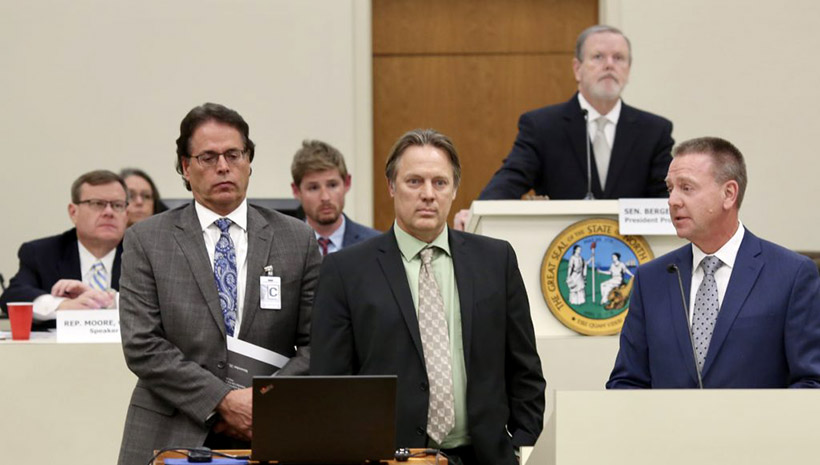Publisher's note: This post appears here courtesy of the Carolina Journal, and written by Rick Henderson.
Eagle Intel Services investigators Frank Brostrom, Tom Beers, and Kevin Greene (front, from left) present their report to a legislative oversight committee Nov. 20, 2019. House Speaker Tim Moore, R-Cleveland is back row, left. Senate leader Phil Berger, R-Rockingham, is at the lectern. | Photo: Don Carrington/Carolina Journal
The utility companies responsible for building the Atlantic Coast Pipeline were confident they would get the environmental permits they needed to start construction in North Carolina. What they didn't know is whether they would win approval in time to avoid costly delays.
The Cooper administration had leverage over the timing and appeared to use it to extract concessions from the pipeline operators, based on an investigation of the ACP process launched by the General Assembly.
That's part of the information gleaned from a
report and supporting documents investigators presented Wednesday, Nov. 20, to a legislative oversight committee tasked with looking into the permitting process of the ACP and a $57.8-million "mitigation fund" pipeline operators agreed to give Gov. Roy Cooper.
"[I]t would be reasonable to conclude that Governor Cooper improperly used the authority and influence of his Office to cause the ACP partnership to commit to a $55 million 'Mitigation Fund' that the Governor placed under his complete control. Governor Cooper continued to use his authority and influence to delay the ACP permitting process until the ACP partners agreed to increase the fund amount to $57.8 million," the investigators from the firm Eagle Intel Services LLC said in the report.
The 600-mile natural gas pipeline, now tied up over legal issues, would run from West Virginia to Robeson County, passing through Virginia along the way. The utility partners building the pipeline - led by Duke Energy and Dominion Energy - needed environmental permits from the federal government and each state before beginning construction.
On consecutive days in January 2018, the Cooper administration awarded the ACP an essential water-quality permit and announced the $57.8-million discretionary fund the ACP partners would provide. The stated reason for the fund was to pay for economic development, renewable energy, and environmental mitigation. But the governor would control the money.
Carolina Journal's reporting raised concerns about the legality of the fund. Public officials and legal experts noted the N.C. Constitution gives the legislative branch full control over state spending.
The General Assembly later directed any proceeds from the fund to public education in affected N.C. counties. But the fund hasn't been created because of continuing legal battles.
The General Assembly in September 2018 hired Eagle, an investigative firm staffed with former FBI and Treasury agents, to look into all aspects of ACP permitting and the discretionary fund.
In May 2017, the pipeline partners applied with the state Department of Environmental Quality for a 401 Water Quality Permit. Duke CEO Lynn Good told investigators she thought the permit should have been issued in May or June.
But it wasn't. During the summer, Cooper adviser Ken Eudy and state Commerce officials pressed Duke officials to defend the purported economic benefits of the project, Duke lobbyist Kathy Hawkins told investigators.
By November, Duke expressed concerns the permit wouldn't be approved before January, the opening of the three-month period the Federal Energy Regulatory Commission allows for tree-cutting in environmentally sensitive areas.
Around that time, ACP officials
told federal regulators delays were costing the operators $70 million a month.
The governor disputes what happened next.
In separate interviews,
Hawkins and
Good told investigators they had a scheduled meeting with Cooper on Nov. 30. Soon after arriving, Cooper asked Hawkins to leave. Good said she and the governor discussed the 401 permits, concerns over coal ash, a dispute between Duke and the solar industry over power grid connections, and the need for a fund to "pay expenses to install gas connections to the ACP." Good said Cooper wanted the pipeline and solar disputes resolved by the end of December 2017.
"Good said she did not ask why Governor Cooper wanted these issues settled by the end of December. She did not know if Cooper's request correlated to the timeframe that the ACP believed they needed to permits to begin felling trees, [listed] as late December 2017."
She added that Duke didn't believe creating a mitigation fund and settling the solar dispute
"had any bearing on the issuance or timing of the 401 permit for the ACP. ... [The] ACP partners and Duke believed that the ACP was entitled to the permits. Good said Duke did not and would not pay for permits."
That evening, Good discussed the details of that meeting by phone with Hawkins. The next day, Good arranged a conference call with Hawkins and two other senior Duke officials to discuss the meeting with Cooper.
But Cooper says that meeting didn't occur, or at least Good's recollection of it was incorrect.
During a media briefing at Wednesday's "Thanksgiving turkey pardon," Cooper responded to a question about the meeting from
WBTV investigative reporter Nick Ochsner.
"That's not true. Absolutely did not happen. And I'll tell you this: the facts are on our side," Cooper said.
The governor dodged a follow-up question.
"Lynn Good told the investigators you had a one-on-one meeting with her in which you said you wanted to get all three of those issues done at the same time, which was the same timeline by which your staff knew Duke needed that permit to begin work on the pipeline," Ochsner said.
"The facts [are] on our side," Cooper responded. He refused to take further questions on the matter.
CJ asked Duke Energy spokeswoman Tammie McGee for comment on how Cooper characterized the meeting with Good. McGee hadn't responded by press time.
Cooper's office hasn't respond to a request for comment.
Thursday afternoon, Lt. Gov. Dan Forest
called on the FBI's Public Corruption Unit to investigate the issue.
Executive Editor Don Carrington provided additional reporting for this story.

